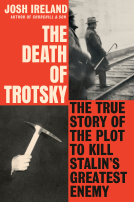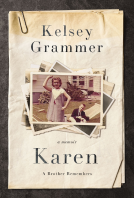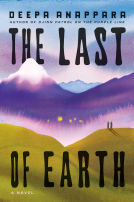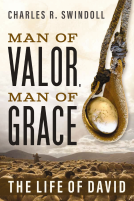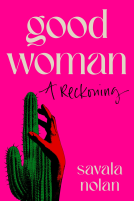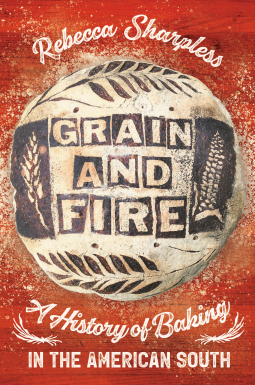
Grain and Fire
A History of Baking in the American South
by Rebecca Sharpless
This title was previously available on NetGalley and is now archived.
Send NetGalley books directly to your Kindle or Kindle app
1
To read on a Kindle or Kindle app, please add kindle@netgalley.com as an approved email address to receive files in your Amazon account. Click here for step-by-step instructions.
2
Also find your Kindle email address within your Amazon account, and enter it here.
Pub Date Jun 28 2022 | Archive Date Jun 07 2022
Talking about this book? Use #GrainandFire #NetGalley. More hashtag tips!
Description
While a luscious layer cake may exemplify the towering glory of southern baking, like everything about the American South, baking is far more complicated than it seems. Rebecca Sharpless here weaves a brilliant chronicle, vast in perspective and entertaining in detail, revealing how three global food traditions—Indigenous American, European, and African—collided with and merged in the economies, cultures, and foodways of the South to create what we know as the southern baking tradition.
Recognizing that sentiments around southern baking run deep, Sharpless takes delight in deflating stereotypes as she delves into the surprising realities underlying the creation and consumption of baked goods. People who controlled the food supply in the South used baking to reinforce their power and make social distinctions. Who used white cornmeal and who used yellow, who put sugar in their cornbread and who did not had traditional meanings for southerners, as did the proportions of flour, fat, and liquid in biscuits. By the twentieth century, however, the popularity of convenience foods and mixes exploded in the region, as it did nationwide. Still, while some regional distinctions have waned, baking in the South continues to be a remarkable, and remarkably tasty, source of identity and entrepreneurship.
Rebecca Sharpless is professor of history at Texas Christian University. Her most recent book is Cooking in Other Women’s Kitchens: Domestic Workers in the South, 1865–1960.
Advance Praise
“What a fine book! Rebecca Sharpless’s deep historical approach—beginning with the breads of the American South created by Native American groups—and graceful and consistent interweaving of the African American experience must be congratulated. This book’s clear voice and style reads like a good long story, told by a real southerner.”—Dr. Leni Sorensen, founder-director of Indigo House Culinary History and Rural Skills Center
“In this sweeping, engaging, and compelling chronicle, Rebecca Sharpless wonderfully evaluates southern baking ‘with a steely eye.’ She serves up an excellent antidote to so much of the nostalgia and mythmaking that can pervade the story of baking in the South.”--Jennifer Jensen Wallach, author of Every Nation Has Its Dish: Black Bodies and Black Food in Twentieth-Century America
Available Editions
| EDITION | Hardcover |
| ISBN | 9781469668369 |
| PRICE | $30.00 (USD) |
Average rating from 22 members
Featured Reviews
 Educator 794430
Educator 794430
Grain and Fire is a well written book. A great reference for my library. Those who love to cook will love this. Thanks 😊
*This book was received as an Advanced Reader's Copy from NetGalley.
Ok, first off, I'm going to start with the fact that this book is rated based on its merit as a historical food book that delves heavily into academic and sociological topics. It is not light reading or even what I would call approachable food history (unless you really, really like the topic). For those of us that are obsessed with the topic, it's great!
Grain and Fire explores how baking in the Southern American states morphed through history, shaped by the people doing the baking (part of the reason I equate this with women's studies as well; while there are male bakers, a good part of history has women doing the baking in multiple fields). As we travel through history, it starts while the South as we even came to know it was forming, its journeys through antebellum and the Civil Rights movements laters, and its current movements in food. This means involving all the people who shaped it, from the indigenous peoples that were there, to the settlers that moved in, the slaves that toiled on the farms, and the families that had to make their way against hardships after the Civil War.
Through it, what people were baking and eating is the thread the brings it together. Corn of course. Wheat as well. But anything that was classified as baking was detailed in this book. While it could be somewhat repetitive at times, and as such a bit drier, I still learned quite a bit. It definitely picked up in the second half of the book, and I really enjoyed the section on current baking trends and wish that section had even been a bit larger since it went all too quick while reading. It was more approachable as well, and had the whole book been written in that concise method (which may have been difficult due to the nature of history) I think it would have opened up a wider audience for this book.
While this is a book about food, given the timeframe and topics, it is also a book about race, social movements, and other human topics. Which makes it a valuable read. Definitely for the lover of all things food history.
Review by M. Reynard 2021
 Haley C, Reviewer
Haley C, Reviewer
This was a heavy read. Definitely, a dense piece that cannot be finished in one sitting. While I did enjoy this book and especially the history it gave about Southern American cuisine it was a slow read. I have only just started to get into food history and am still at a point where I need quicker reads. I think this book is great for food history buffs who want a more in-depth analysis. As a Southerner myself I could see myself pulling this off the bookshelf to read a chapter at a time after making one of the dishes mentioned, but I don't see me rereading this in full anytime soon.
I received this book for free from NetGalley in exchange for an honest review.
"Grain and Fire: A History of Baking in the American South" is an interesting food history book. However, it doesn't just provide the evolution of baking; it also incorporates the history of how the South itself was settled, from the earliest days when the people living there were Native Americans to present-day Southern society. I found the book to be engaging, particularly all the descriptions of various recipes used and the unique ingredients that went into them. It shows true human ingenuity and, in some cases, perseverance and self-preservation during difficult times in Southern history. If you want a book that creates a unique spin on food and American history, then this is the book for you
Thank you to NetGalley and University of North Carolina Press for this advanced copy, which I voluntarily read and reviewed. All thoughts and opinions are my own.
 Beth C, Reviewer
Beth C, Reviewer
I received an advance copy of this book via NetGalley.
Baking defines the south--but why? How did cornbread and biscuits come to represent a large chunk of the country and become what we know of as the ultimate in carbohydrate-graced comfort foods? Author Rebecca Sharpless explores the vast, complicated history of baking in the American southeast beginning with Native American tribes (who did indeed bake a lot by making bread using things such as acorn flour), to the arrival of early European explorers, to the slave trade and the resultant innovations and influences of the enslaved upon the slavers, to Latin influences largely in Florida and Texas, up to the modern day where the diversity of the world fuses with southern classics.
I found the book fascinating and utterly approachable, an academic read that any baking and history buff could dig into and enjoy. I see this as a strong companion book to Michael W. Twitty's The Cooking Gene, which touched on his personal exploration of black and Jewish influences on southern cuisine. Sharpless's book is broader in scope and incredibly inclusive of other influences, and talks not just about ingredients and farming, but major advances in technology from mechanical hand beaters to baking powder to the expansion of powerhouses like Krispy Kreme.
Though the scope is broad, it still feels intimate. The author beings in many black voices whose experiences in slavery and afterward were recorded by WPA projects in the 1930s. The love--and sometimes embarrassment--around cornbread is an interesting theme across the centuries, too. Wheat didn't grow well in the south, despite rigorous efforts during colonization. The major reliance was on corn, and how attitudes around that have evolved over time is intriguing and often sad, as poverty and racism often are involved.
